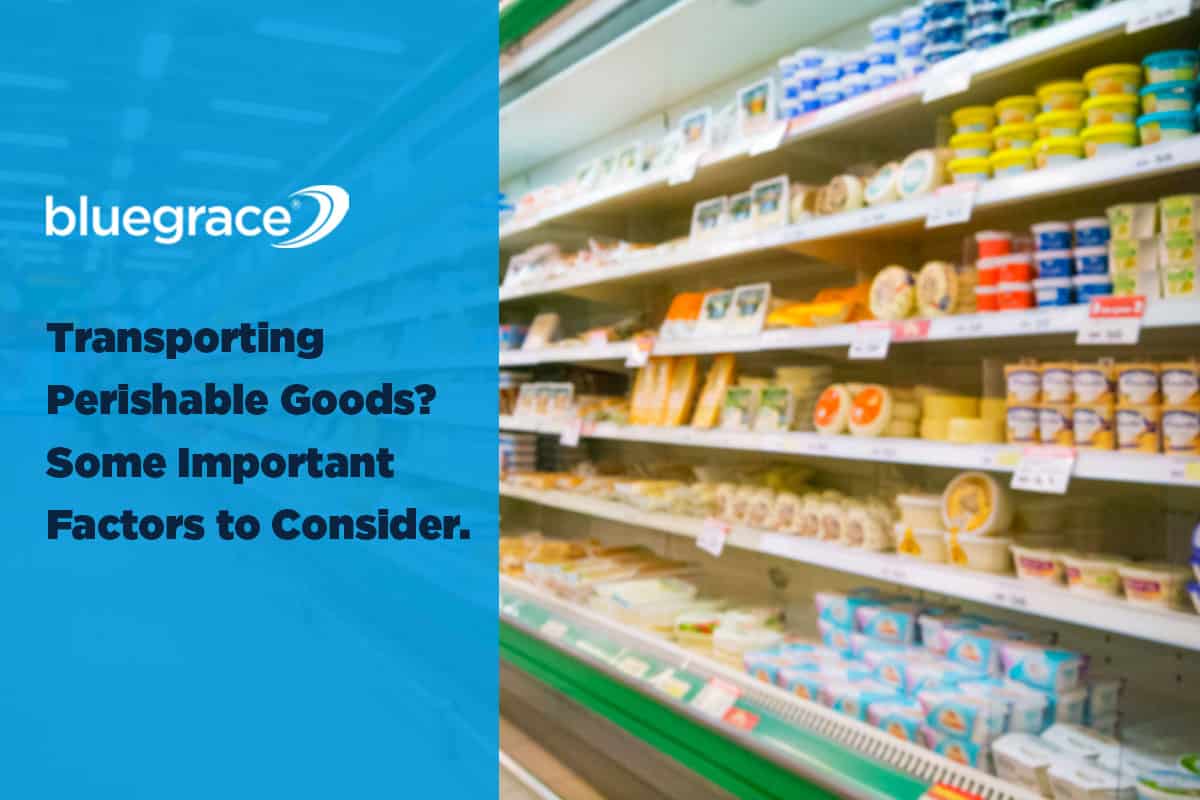

Transporting perishable goods and fresh produce is fraught with higher risks than most surface transportation, there is a risk of spoilage, loss of freshness and quality.
Perishable goods require a specialized service provider with intimate knowledge of refrigerated trailers, or reefers. It enables the movement of goods like fruits, vegetables, seafood, some medicine and other pharma products, dairy and bakery products, meat, and flowers and plants. Refrigerated trucking helps connect farmers, bakers, meat production plants, pharma companies with markets and ensures end customers even at remote locations get fresh and quality products.
While North America has a static network for refrigerated transportation, its demand significantly increases out of regions with active harvests, commonly referred to as “Produce Season”
While North America has a static network for refrigerated transportation, its demand significantly increases out of regions with active harvests, commonly referred to as “Produce Season”. Given that the season is now in full swing, let’s take a look at what factors should be considered by both shippers and transportation partners while facilitating the movement of fresh produce and perishable goods.
What important factors should shippers keep in mind while transporting fresh produce?
Each fresh produce or perishable product has a specific shipping requirement, like the mode of transportation, type of container, temperature settings, and the transit time it can tolerate.
If even one of the transport requirements of perishables is not met, the goods can become unfit for consumption or further processing.
If even one of the transport requirements of perishables is not met, the goods can become unfit for consumption or further processing. To ensure that this does not happen, here are a few points that shippers must keep in mind while transporting their fresh produce:
Complete Product Knowledge: This is non-negotiable. For safe and smooth transport of their perishable products or fresh produce, it is necessary for shippers to clearly define these expectations to their warehousing and transportation partners. Some important things that shippers and their teams should share about the fresh/perishable product they deal in are:
- Packaging requirements of the product.
- The best method and transport mode to ship it.
- What is the temperature requirement – are there OptiSet or Intelliset temperature settings available
- The temperature needs of the product while in transit and what is proper protocol if an issue arises in transit.
- Tolerable transit time for the product to aide in the recovery of delay
- Food safety requirements unique to your product
- The documents/formalities required in both the importing and exporting state/country.
Conduct a Market Study: It’s important to find the right market for fresh produce, especially for those products that spoil easily. It’s financially beneficial for the shipper if this product reaches the market quickly and in good condition. It’s also beneficial for the buyers as they get better quality and fresh products. So, before you decide on a specific market, conduct a study to find out:
- When and where your product is going to be in peak demand, consider local growing seasons you will be competing with.
- The rate at which you can deliver and distribute in the given market
- The transit time to various markets and how fast can you replenish.
- Outlets or Wholesale partners in the event of a quality rejection
- Any specific customs formalities/documents required by the importing state for this product
Once you have this information ready, you can pick the best possible combination of market, rate, and transport requirements.
Choose the Right Transporter: If fresh produce is not managed correctly during transit, the quality and shelf life can be negatively affected. Thus, the choice of the transportation provider can make a huge difference in how your product is shipped. So, when you’re searching for a transportation partner, you must check the following:
- The track record of the transportation provider in moving perishable goods.
- Do they have the requisite experience, and references?
- Is the equipment well-maintained, cleaned, and serviced regularly?
- Are the drivers trained to manage the special equipment and carry perishable or fresh produce?
- Do they have tie-ups with service centers en route, in case the equipment or vehicle needs emergency servicing?
- Can they replace the container or the carrier in case of a breakdown?
- What is the transit time being offered and do they have the ability to expedite?
- Does the provider have ample capacity to be flexible in a fluid situation?
In the event you can use a multimodal approach to ship your cargo, carry out this exercise for all the providers. Also look for opportunities to consolidate where transportation providers have multiple service lines.
Provide Clear Instructions: Once you’ve selected the transporter(s), it is important to communicate instructions specific to your product clearly to them. Make sure they know how the product is to be handled, the temperature to be maintained throughout the transit, and if it is an LTL shipment, then which products/goods can it not be carried with or kept close to. In the case of multimodal transportation, provide a set of instructions to each transportation partner and make sure each provider knows who to hand over the cargo and onward shipping instructions to.
Communication with the Buyer: It’s often observed that while the goods reach the destination safely, they get spoiled at the buyer’s facility for lack of proper instructions on how to manage/store the goods. Hence, it is necessary to make sure that proper instructions have also been communicated to the buyer.
Get Adequate Insurance Coverage: Transporting perishables and fresh produce is expensive. There is also a risk of spoilage on the way. This is why insurance is critical in such cases. Before you put your cargo in transit, make sure you have the right insurance coverage for the cargo. This will ensure that you have financial support in case the cargo does not reach the destination in the best condition.
What Important Factors Should the Transporters Keep in Mind When Transporting Fresh Produce?
The transportation provider is responsible for the perishable products while the goods are in transit. Hence, it is necessary for transportation providers to also have a checklist for perishable goods and fresh produce. Here are some important points that they should keep in mind when accepting fresh produce goods for transportation:
- Communicate Clearly with the Shipper: Transporting perishable goods is time sensitive. Make sure you share the correct information regarding transit time, the route to be taken, contingency plans, and documentation requirements, with the shipper at the time of inquiry. This not only helps the shipper make an informed decision, but also helps your business avoid unnecessary risks.
- Get All Required Details from the Shipper: The transportation provider should double-check if the shipper has supplied all the required information or not. In case any crucial detail regarding the product is missing, they should proactively ask for it from the shipper prior to departing in order to avoid delays in transit
- Discuss Packaging Requirements: Check with the shipper how the goods will be packed and labeled. In case there are any specific requirements for packaging and labeling at your end, communicate the same to the shipper. It is important to get the packaging and labeling right in case of perishable goods as they need to be handled with care and can spoil easily.
- Understand Handling and Temperature Instructions: For perishable goods, the transportation provider needs to understand how the goods are to be handled and what temperature is to be maintained while the goods are in transit. Also, check if there are any specific guidelines on how the temperature is to be managed while the cargo is being loaded/unloaded.
- Assist the Shipper with Documentation: Fresh produce and perishable goods often have more documentation needs than regular cargo. Sometimes shippers, especially those new to the trade, are not aware of the cross-border documentation. In such cases, it becomes the transportation providers’ duty to make sure the shipper completes all documentation requirements in the right format. This not only helps complete the shipment formalities but also helps the trucker while crossing the state borders.
- Service the Reefers Before Allotting: The transportation provider should make sure the reefer is properly serviced, cleaned, and checked before it is allotted to the shipper. They should also monitor the temperature throughout the transit and report any discrepancies to the shipper.
- Train Your Drivers to Handle Perishable Goods: For transporting perishable cargo safely, it is essential to have experienced and trained drivers on board. The driver should understand the handling instructions of the fresh produce and be able to manage temperature settings of the reefer container.
- Update the Shipper Timely: Share regular status updates with the shipper while the goods are in transit. In case there are any issues with the container or temperature monitor, inform the shipper immediately, and seek alternative solutions.
- Deliver On-Time: It’s a good practice for logistics and trucking service providers to deliver goods on time. In the case of perishable goods and fresh produce, on-time delivery is crucial as even a slight delay in transit can affect the quality of goods, spoil them or make them unfit for consumption. Hence, it is necessary to make sure that the entire team handling the cargo understands the importance of on-time delivery!
If you’re looking for a reliable partner to transport your fresh produce and perishable goods, get in touch with our team today! We not only take responsibility for delivering your goods on time but also ensure that you get access to an online platform powered with advanced technology to plan and monitor your shipments more effectively!


